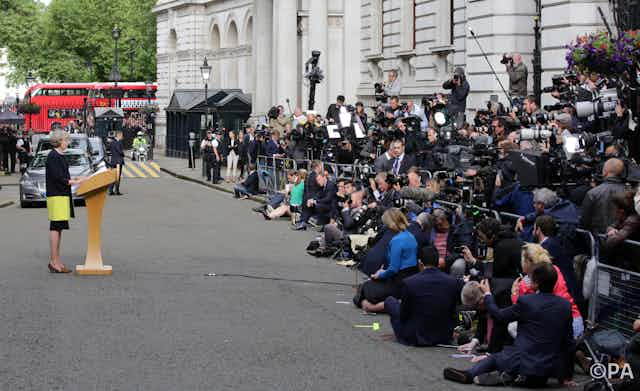In exercising her power to choose her government ministers, the new British prime minister, Theresa May, has taken an important early step towards realising her three priorities: uniting her party, delivering withdrawal from the European Union (or Brexit), and governing “for everyone, not just the privileged few”.
Prime ministers must weigh up a number of overlapping but distinct criteria when deciding who to appoint to the top jobs around the cabinet table. Potential candidates must obviously have a degree of “governmental competence” – that is, the ability to master a departmental brief, work with officials and other ministers, and lead a department. At the same time, potential ministers must also possess some measure of “political utility”. They will have a particular constituency in the party or country, and they will have the skills to mobilise that constituency in support of the government.
Related to the second criterion is a third – “presentational competence”. That is the ability to perform in parliament, in the newsroom and in front of the public to a satisfactory level. Few ministers will survive long, at least in front-line roles, if they cannot present themselves well.
Another criterion is generally less important, if only because most ministers are happy to trim their ideological sails to the wind: prime ministers will want to appoint individuals who are “policy compatible” with them. They will not want to appoint committed ideologues whose ideas are very different from their own, since it risks subsequent tension and disagreement. It regularly is said that a week is a long time in politics, but prime ministers need always to think several months if not years ahead.
Prime ministers must also be mindful of how appointments look as a whole. They will want gender balance in their cabinet as far as possible, and they will also want a government that reflects the ethnic diversity of society. Moreover, prime ministers will want to appoint ministers from all parts of the country, where possible, and from different ideological factions within the party, again where possible.
Balancing these considerations is never easy. Every individual appointment involves a trade-off. With good reason, Harold Wilson described major reshuffles as being “like a nightmarish multidimensional jigsaw puzzle”. Still, prime ministers have to start somewhere, and they usually start with the most important jobs.
Why Boris?
Theresa May’s initial appointments, made during her first evening in post, reflect her priorities and what she thinks are the most important jobs. Among the great offices of state, Philip Hammond became chancellor of the exchequer, Boris Johnson was made foreign secretary, and Amber Rudd took on the role of home secretary. Michael Fallon retained his job in defence. But there were also two new posts: Liam Fox was made international trade secretary, and David Davis the minister responsible for Brexit.
All these initial appointments, and especially Boris Johnson’s as foreign secretary, reflect domestic considerations. They have to, because it’s progress on the domestic front that will make or break May’s fortunes.

Above all, these key appointments are about placating the Conservative right. Labour is not a threat to May’s short- or medium-term prospects, but the Conservative right is. There is a small number of what might be termed committed Brexit-maxers on the Tory benches. These are the MPs who would prefer to leave the EU immediately and who are willing to sacrifice any access to the single market if it involves accepting some freedom of movement. These MPs have form when it comes to wreaking havoc in the House of Commons. And May has a very small parliamentary majority.
Davis and Fox, both committed Brexiters, are now responsible respectively for delivering on withdrawal from the EU and Britain’s economic future outside of it. Johnson, for his part, has been locked into supporting the final outcome of any exit negotiations by taking such a senior job. May is probably still developing her ideas about what she wants from the negotiations, but she needs to keep her options open. She has to guard against the possibility of upsetting Brexit-maxers. Even limited access to the single market is likely to require some compromise with the EU.
Unfortunately for May, any whiff of compromise will be a red rag to the Brexit-maxers. In the months ahead, she will need Johnson’s support among Conservatives. He has influence in parts of the party she can’t reach. He has the charisma and chutzpah to defend the government and take on the committed eurosceptics. By having such a senior job, he will be expected to defend any final agreement with very great zeal.
Put another way, Johnson brings all-important political utility to May’s cabinet. His appointment expands her future room for manoeuvre. Johnson is not a natural diplomat, and May has taken a calculated risk in appointing him given the baggage he brings with him. Ultimately, though, May is concerned with his domestic value. She is much less concerned with how the new foreign secretary reflects on Britain.

